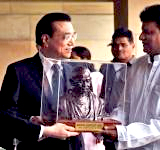 Beijing, May 20: Underlining that China's "surrounding environment" will suffer if India becomes another Japan or Philippines in confronting it, Chinese media today called for understanding and respect for "Indian sense of national pride".
Beijing, May 20: Underlining that China's "surrounding environment" will suffer if India becomes another Japan or Philippines in confronting it, Chinese media today called for understanding and respect for "Indian sense of national pride".
As Chinese Premier Li Keqiang kicks off second day of his India tour, the Chinese official media is full of reports and analysis of Sino-India ties with one tabloid daily, the Global Times, came out with editorial, saying that 'Sino-India ties transcend media hype'.
"There are many weaknesses in the bilateral relationship which can be exploited by outsiders. Without mutual respect, small frictions can be exaggerated," it said, apparently referring to a recent military stand off at the Daulat Beig Old in Ladakh area after Chinese troops intruded 19 kms inside Indian territory.
"The Indian sense of national pride is very strong but Chinese society doesn't want to adapt. Chinese people lack understanding and respect toward India. They tend to judge it according to ill-conceived preconceptions," it said.
"However, China's surrounding environment will suffer if India, a country which has the prospect of running neck-and- neck with China, becomes another Japan or Philippines in terms of its policies toward China," it said, noting that the situation at the Sino-Indian border is much better than the disputed islands with Japan or South China Sea, where Beijing is locked up in maritime disputes.
However, the relationship is at its "best period in decades despite mutual suspicion".
"Both China and India should bear the primary responsibility for cultivating the bilateral relationship. They should create more 'good news' to counter media hype. Not only determination, but also wisdom is needed to develop Sino-Indian strategic ties," it said.
"Grumbling about media coverage doesn't help. Governments should also play a role in guiding public opinion," it said.
Referring to Li's choice to make India the first stop of his maiden foreign tour, it said, "his selection of India for his first overseas trip has widely been interpreted as a sign that China is attaching greater importance and respect to this large neighbour".
Stating that the bilateral ties are plagued by negative news causing more negative public opinion "than the reality warrants", the editorial referred to the "tent confrontation" between the two sides that made headlines.
"It's difficult to simply judge Sino-Indian relations as 'good' or 'bad'. New conflicts initiated by border disputes may break out at any time, according to worst-case scenarios.
"Both sides have been trying to divert the focus of the bilateral relationship from border disputes to other areas. In spite of media hype, both sides share a common will in terms of preventing border problems from impeding Sino-Indian ties," it said, adding that "such rationality is commendable in present-day Asia where nationalism runs rampant".
Being two large emerging countries, India and China have many common interests on major issues such as the global financial order and climate change, which means that the two countries must seek cooperation, it said.
"China and India's combined potential are large enough to make the West anxious. Internal dissension between China and India meets Western interests," it said.






Comments
Add new comment